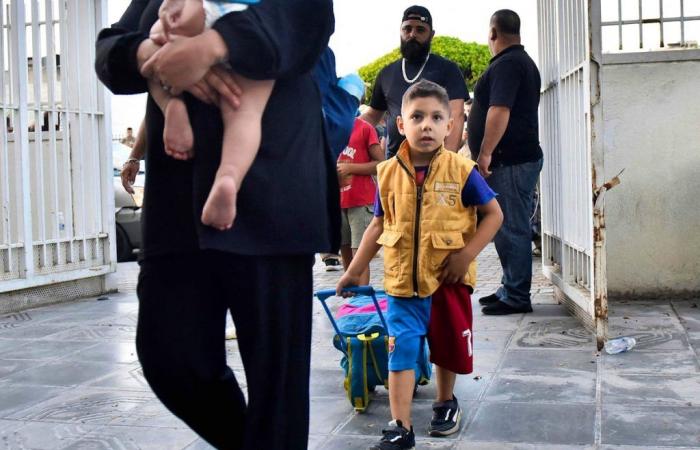Refugee families who fled their villages in southern Lebanon are welcomed into an art institute transformed into a shelter for people displaced by the conflict, in Beirut, September 23, 2024.
AFP
As Israel celebrates Yom Kippur, Judaism’s holiest day, its troops battle Hezbollah in Lebanon and Hamas in Gaza, with Prime Minister Benjamin Netanyahu vowing to continue the fight against these Islamist groups “until victory” allies of Iran.
“For your own protection, do not return home until further notice. Don’t head south; anyone heading south risks putting their life in danger,” army spokesperson Avichay Adraee wrote in an Arabic message on X.
After the intensification of Israeli strikes on southern Lebanon on September 23, tens of thousands of families fled this region, according to the Lebanese authorities and the UN.
The army has further warned health personnel in southern Lebanon to stay away from ambulances which it says are used by Hezbollah to “transport terrorists and weapons”.
New Israeli bombings targeted southern Lebanon, while Hezbollah announced that it had fired missiles at a military base near Haifa, the day after drone strikes on this large city in northern Israel.
These hostilities take place while from Friday evening to Saturday evening, Israel celebrates Yom Kippur, the day of “great atonement” during which everything virtually stops in the country: borders, airports and most businesses are closed and transport public do not ride.
After weakening Hamas in Gaza, Israel moved the war front to Lebanon in September, with the aim of moving Hezbollah away from the border areas and stopping its rocket fire to allow the return to the north of Israel of some 60,000 displaced inhabitants.
The front opened in October 2023 by Hezbollah against Israel, in support of Hamas, transformed into open war on September 23 with the start of intense Israeli bombings on Hezbollah strongholds in Lebanon. The Israeli army also launched a ground offensive on September 30 in southern Lebanon.
Israel came under fire on Friday after firing on the UN Interim Force (UNIFIL) stationed in southern Lebanon. Four peacekeepers were injured in 48 hours. US President Joe Biden asked Israel to no longer fire on UN forces in Lebanon, while his French counterpart Emmanuel Macron deemed it “unacceptable” that they were targeted “deliberately by Israeli forces”. The Israeli army said Friday it had fired in the direction of a “threat.”
Since October 2023, more than 2,100 people have been killed in Lebanon, including more than 1,200 since September 23, according to an AFP count based on official figures. The UN has recorded nearly 700,000 displaced people.
On Saturday, Iranian Parliament Speaker Mohammad-Bagher Ghalibaf visited the site of an Israeli strike in central Beirut that killed at least 22 people on Thursday. The day before, Iran had repeated that it was “ready to defend its sovereignty”, while Israel promised its sworn enemy a “deadly, precise and surprising attack” on its missile launches on October 1.
In the devastated and besieged Gaza Strip, the Israeli army continued its offensive, mainly shelling the region of Jabalia (north), where it accuses Hamas of seeking to reconstitute its forces.
According to local Civil Defense, 30 Palestinians were killed Friday in strikes on Jabalia. Several of the bodies were taken to Gaza’s Al-Ahli hospital, according to AFP footage which showed a relative hugging the lifeless body of a child. Not far away, a man cries next to bodies. “Children are dying, this girl is only two months old. What did she do to deserve this?” Israel called on residents of an area near Jabalia to evacuate.
The Hamas attack on October 7, 2023 resulted in the deaths of 1,206 people in Israel, the majority civilians, according to an AFP count based on official Israeli figures and including hostages who died or were killed in captivity in Gaza. At least 42,175 Palestinians were killed, the majority civilians, in the Israeli offensive in Gaza, according to data from the Hamas government’s Health Ministry, deemed reliable by the UN.






